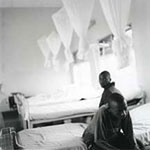


Main gallery
The 2008 Corcoran Print Portfolio Show
You Won't Believe Your Eyes: The 23rd Annual Printmaking Portfolio
February 15 – March 1, 2008
OPENING RECEPTION:
Friday, February 15, 2008, 7-9 pm
READING from the "You Won’t Believe Your Eyes" chap book:
Thursday, February 28, 2008, 7:30 pm
Civilian partners with the Corcoran College of Art & Design's Print Department to present the works of 31 artists who have made prints for the 2008 Corcoran Print Portfolio under the theme You Won't Believe Your Eyes. The portfolios are available for advanced preview by contacting Civilian.
You Won't Believe Your Eyes features lithographs, etchings, screen-prints, letterpress, papermaking, relief and digital prints by: Aimee Anthony, Meaghan Busch, Patricia Correa, Dane Austin Criner, Tracey Cullen, Georgia Deal, Bridget Dwyer, Elizabeth Grusin-Howe, Melissa P. Hackmann, Bethany Hansen, Carolyn Hartmann, Hedieh Ilchi, Ema Ishii, Carolee Jakes, Elizabeth Klimek, Eric Klug, Andrew, Kozlowski, Pepa Leon*, Kate Libcke, Kerry McAleer-Keeler, Pierrette Montone, Manuel Navarrete, William A. Newman*, Dennis O'Neil with Alexander Djikia, Dan Payn, Tracy Pilzer, Lynn Sures, Paula Wachsstock, Ann-Cathrine Wasmuth, Randolph Williams, and Amy Zaiss. Participants have been involved in every aspect of producing the exhibition and the portfolio including design, printing and installation.
This year's theme -- You Won't Believe Your Eyes -- speaks to the increasing difficulty of trusting what we see. From our current condition of media saturation and manipulation, seeing is believing is no longer a true statement. "We're examining reality while at the same time, retreating from it," explains participating artist Tracy Pilzer.
* Pepa Leon is represented by REYES+DAVIS. William A. Newman is represented by Adamson Gallery.
Project Space
Evie Lovett
Eyes of Rwanda: Portraits from the Hospital in Rwinkwavu
In 2005, the Boston-based organization Partners in Health, founded by the visionary Dr. Paul Farmer, was invited by the government of Rwanda and given funding by the Clinton Foundation's HIV/AIDS Initiative to bring their model for AIDS treatment to rural Rwanda. The government selected this region, described by one Rwandan government minister as one of the most destitute areas in Rwanda, for this model clinic. They rebuilt the hospital, left untouched since the 1994 genocide. In November 2006, Evie Lovett was invited to visit and photograph a hospital in Rwinkwavu, in eastern Rwanda.  She was the first photographer permitted to photograph there.
She was the first photographer permitted to photograph there.
Not your typical photojournalistic images, Eyes of Rwanda is the personal story of life and survival in a hospital in a society that has recently experienced the worst of humanity. The photos depict everyday medical occurrences and recovery mixed with the signs of a society in need of resources as it continues to move beyond the past. "Clean white sheets. Women laughing over dishes in the kitchen. Hope, dignity, the possibility of survival -- all this in a place which is the most densely populated country in Africa, one of the poorest, where average life expectancy is 38 years, a place which can never run away from the horror of its recent history," writes Lovett.
Please click here for the full press release in PDF format.